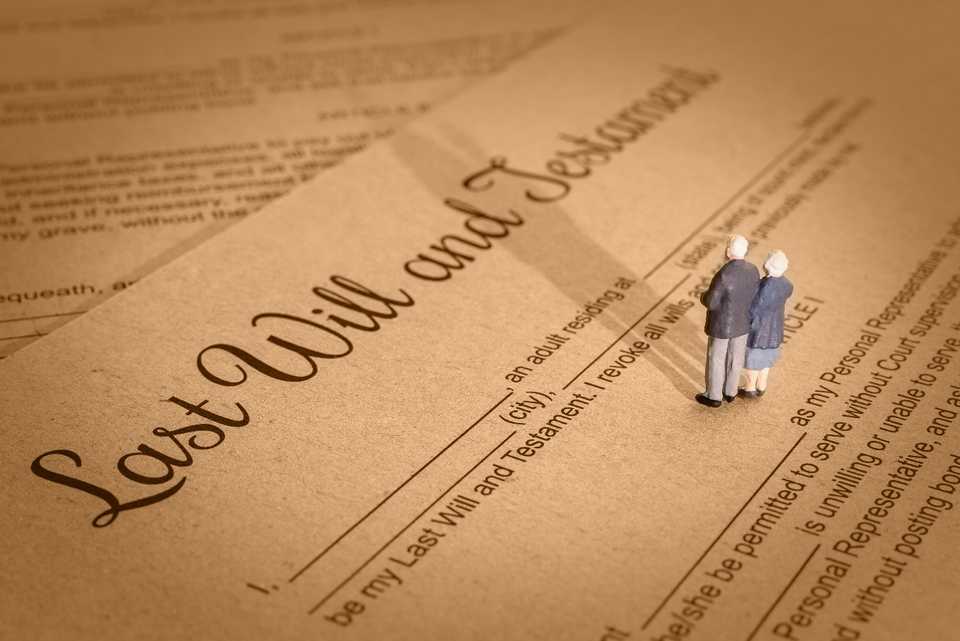In Ontario, estate planning refers to the preparation of legal documents and instructions that specify your wishes upon death.
An estate plan is more than just a last will since it includes other aspects such as designating guardians for minor children, executing a Power of Attorney, the appointment of executors of your estate, etc. Thus, it is more comprehensive.

Planning your estate is important especially if you have significant assets such as real estate properties, etc.
The best way to do estate planning is with lawyers who specialize in estates and wills. These legal experts can help you every step of the way to ensure that all the legal documents are prepared.
Compare estate lawyers in Ontario by using our short online form, free of charge, and save time and money!
How to create an estate plan in Ontario
The creation of an estate plan seems very complicated but in reality, it can be simple if you know what to do.

Allow us to show you the 4 basic steps to create an estate plan.
Step 1: Identify who you wish to include in your estate plan
Before you begin your estate plan, determine who the important people are that will play a part in your estate plan. Below are the key roles to consider:
- Executor: This is someone you trust to administer your estate and execute your final wishes. It can be a lawyer, a family member, or a member of your inner circle.
- **Guardian:**If you have young children, you will need to choose someone to be their guardian in the event of your demise.
- Beneficiaries: You must choose the beneficiaries who will receive your assets.
- Power of Attorney: You must appoint someone you trust to make legal and financial decisions in your stead if you are incapacitated.
- Witnesses: You need persons to act as witnesses of your will and other legal documents.
Step 2: Decide on how you want your estate to be distributed.
The beneficiary or beneficiaries specified in your will receive your properties, assets, or personal belongings in the event of your death. As part of your estate plan, you must determine who will receive the assets you leave behind.
It is also possible for you to choose a favorite charity as a beneficiary.
Step 3: Indicate any additional wishes you want to be followed.
Aside from how your assets are to be distributed, you can also include funeral or burial instructions, donations to charity, and other personal instructions.
Step 4: Finalize your estate plans.
When you have determined the above, you can now finalize your estate plan and other instructions. An estate lawyer can prepare the documents for your approval and ask witnesses to sign.
As you can see, the difficult part of creating an estate plan is making the decisions. Once you have determined the key persons of your plan and your beneficiaries, your estate lawyer will take care of everything!
You can find an estate lawyer in Ontario to assist you with your estate plan or last will by filling out our free online form!
Documents needed for estate planning in Ontario
Estate Planning for Elderly Persons
Estate planning is very important for seniors for a variety of reasons:
- **Assets:**Estate planning allows seniors and elderly parents to specify how their assets are divided among their family members. This ensures that the assets go to the persons or causes that are important to you. If you don’t have a will, the court can decide what happens to your estate even if you have promised beneficiaries their inheritance.
- **Estate Tax:**Seniors can minimize estate taxes, especially if they have significant wealth. Giving a property as a gift ahead of time can reduce the tax burdens on your beneficiaries.
-
- Security of Loved Ones: Estate planning provides financial security to a surviving partner and other family members. Naming a partner as the beneficiary of a life insurance policy and registered bank accounts, for instance. It will ensure ongoing financial support for the surviving spouse.
-
- **Healthcare Decisions:**Advanced directives are important as they allow seniors and elderly parents to choose someone they trust to make healthcare decisions in case they become incapacitated.
-
- **Avoid Probate:**Many elderly Canadians use estate planning to avoid the probate process or minimize the time and cost of going to probate court.
You can leave a meaningful legacy to your loved ones with a strategic and comprehensive estate plan.
Find an estate lawyer from JuriGo to help with your last will or estate planning.
The Practice of Trusts and Estates: What do they include?

The area of law for Trusts and Estates deals with all legal aspects pertaining to the preservation, enjoyment, and transfer of family wealth.
Lawyers who practice this field are very knowledgeable about wills and trusts laws, income tax laws, and issues for consideration of clients who own multiple assets in different jurisdictions.
- It also includes the preparation of trusts, wills, power of attorneys for finances, medical or healthcare directives, etc.
- For the wealthy, estate planning can make use of trusts to divide income or pass on future assets to the next generation without sacrificing the client’s financial security while still alive.
- Trusts are also appropriate for planning asset distribution among blended families.
- Administration services for Trust and Estate also include providing assistance to representatives for the probate of a will or in the absence of a will, Letters of Administration.
- Advice is also given regarding assets and liabilities and communicating with the beneficiaries regarding the terms and conditions of a will.
- Advise and represent the client’s representatives and beneficiaries regarding the estate’s administration or resolve disputes if they arise.
How is an Estate distributed without a Will in Ontario?

The Succession Law Reform Act of Ontario determines how an estate is divided if a person passes without leaving a will.
If the person is survived by a spouse and children, the estate goes to them first.
Distribution of an estate without heirs
In the absence of “heirs”, the law directs that the estate be distributed as follows:
- The estate will be distributed to the parents of the deceased (either equally or to a single parent if one or both parents are living).
- If parents are deceased, the estate will be distributed among the siblings (note: if a sibling is deceased, his share goes to his children.)
- Without living parents or siblings, the estate will be distributed amongst the nieces and nephews of the deceased.
- If none of the above are alive, the estate will become the property of the Crown.
Why Wills Are Critical for Estate Planning
As you can see from the above section, estate planning, whether you have heirs or not, is important for any individual with assets.
You want to make sure that your assets are given to your chosen beneficiary. If you don’t have a will, your assets will follow the Succession Law Reform Act. Your personal wishes will no longer come into play. For example, if your only living relative is a nephew with whom you have no relationship, you may want to bequeath your house to a cause or charity you support.
A will also covers other aspects of your life such as burial or funeral arrangements. These instructions can be very helpful to the family members you leave behind and prevent any conflicts after your death.
Avoid Intestacy
You may not want to deal with making a last will and testament but down the line, it could create a lot of work for your family members.
If you pass away without a will, you will die “intestate”. This means that your family members need to apply to the court for your estate to be distributed.
Potential beneficiaries may get into disputes and complicate the process further because they don’t have any direction from you.
Protecting the Interests of a Common-Law Partner
Relating to the principle of the hierarchy of heirs, a common-law spouse in Ontario cannot inherit from an “intestate” estate.
If you die without a will, the distribution of your estate will be based on the Succession Law Reform Act which prioritizes spouses, children, parents, and siblings.
Are you in a common-law relationship? Protect the interests of your common-law partner by making a last will.
Power of Attorney – When and why do you need it?

Preparing a power of attorney is important and must be done by everyone sooner rather than later.
As explained earlier, a power of attorney designates someone to make important decisions regarding your finances, personal life, property, and medical care if you cannot make them yourself.
In simple terms, a power of attorney is your disability insurance which will take care of your life while you are alive but incapacitated.
If you don’t have a power of attorney, your family members will need to apply to the court to become your guardian. The law regarding the power of attorney for personal care varies among the provinces. During a critical time related to life support or medical treatment, delays will become inevitable without a power of attorney.
Ontario Power of Attorney: Purposes and Types

The Power of Attorney Act of 1990 in Ontario grants another individual of your choice to act on your behalf in the event you cannot make them due to incapacity.
For financial and legal matters, a power of attorney for property and a power of attorney for personal care are designated.
What Is A Power of Attorney For Personal Care In Ontario?
A power of attorney (POA) for personal care allows someone to make decisions regarding your meals, housing, clothing, and health. For example, the responsible person can communicate your wishes regarding life support and advanced directives.
Usually, a spouse, close friend, or relative with good judgment and personal knowledge of your wishes is given this power of attorney.
What Is A Power of Attorney For Property In Ontario?
A power of attorney for property in Ontario can decide regarding your finances, investments, or property, and manage your bills or collect money owed to you.
Contrary to popular belief, a power of attorney is not just for the elderly or those making end-of-life decisions. A power of attorney document provides protection and security if you become incapacitated.
It can happen to anybody at any time due to medical emergencies or accidents.
Do you need a lawyer to create a will in Ontario?

A last will and testament is a declaration of what you want to do with your possessions and assets upon your death.
Whilethe law does not require you to hire a lawyer to make a will, you can greatly benefit from a lawyer’s expertise and advice.
For complex estates or those who want to include clauses in the wil l, having a lawyer draft it for you is advisable.
You may think you don’t have significant wealth to pass on and a will can be simple to do. The truth is that a will is best prepared with the help of an estate lawyer. He will make sure that the will complies with mandated procedures to make it legal and binding.
The specific circumstances of your life – being a business owner, having a common-law partner, or being in a blended family- can have unique requirements regarding your assets. An estate lawyer can help prepare your will to give you and the people you love the peace of mind you deserve.
You must also remember that a will can be contested in court if it does not comply with the legal requirements.
The Cost of an Estate Lawyer in Ontario
In Ontario, you have to pay legal fees if you ask a lawyer to prepare your will . The cost will vary among estate lawyers depending on the specialization and skills. The complexity of your estate will also have a big impact on your legal fees.
An individual with minimal assets will not pay as much as someone with complex personal circumstances and significant wealth.
The law firm’s fee structure may also require you to pay expenses incurred during the preparation of your will such as filing fees, travel expenses, printing, etc.
Below are the average prices for estate lawyers’ services.
| Type of Service | Average Price |
|---|---|
| Probate of a will (simple and no-contest) | $2,000 - $2,500 |
| Prepare a last will | $500 - $1,500 (plus expenses) |
| Power of Attorney | $200 - $300 per document |
| Estate Plan | $1,000 - $5,000 |
The best way to get an accurate estimate on lawyer fees’ is to fill out our short online form and receive free and no-obligation quotes.
Find lawyers for estate planning and wills in Ontario

Estate planning is an important step not only for seniors and elderly parents but also for mature individuals who want to plan for financial security, healthcare control, tax savings, personal and medical care, and legacy.
It's never too early or too late to make a will or plan your estate for your peace of mind. The time to act is NOW.
Compare estate lawyers in Ottawa, Toronto, or anywhere in Ontario by filling out the short online form below!
